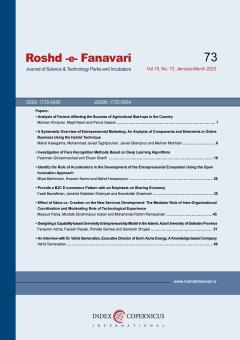Identify the role of accelerators in the development of the entrepreneurial ecosystem using the open innovation approach
Subject Areas : اکوسیستمهای کارآفرینی و نوآوری
milad bakhsham
1
![]() ,
hosein karimi
2
,
mahdi hosseinpour
3
*
,
hosein karimi
2
,
mahdi hosseinpour
3
*
![]()
1 - abcdarian
2 - Razi University
3 - Razi University
Keywords: Entrepreneurship, Entrepreneurial Ecosystem, Open Innovation, Accelerator. ,
Abstract :
Today, a society can move forward and rapidly in the path of development, equipping itself with productive entrepreneurial knowledge and skills by creating the necessary resources to use this valuable capability, other resources of the society to create value and achieve growth and development, Manage and direct. Promoting entrepreneurship requires an ecosystem. The aim of this study is to identify the role of accelerators in the development of entrepreneurial ecosystem using an open innovation approach. The design of this research is qualitative (multiple case study) and is fundamental in terms of research method. Therefore, semi-structured interviews were conducted with 20 main human resources of Kermanshah accelerator centers, which were selected using judgmental sampling method. In the present study, a two-stage coding method was used to analyze the interview findings. Finally, according to the research findings and coding, the role of business accelerator centers on the development of entrepreneurial ecosystem using an open innovation approach in two parts before the start-up and after the start-up has been identified and studied. The results show that accelerators, by creating a coordinated network between the actors of the startup ecosystem and the entrepreneurial ecosystem and their partners, Creating relationships based on common vertical and horizontal connections between ecosystem actors, Creating value in predetermined partnerships and programs and creating a network of communication between ecosystem actors and networks and companies outside the ecosystem play a role in the development of the entrepreneurial ecosystem.
1. علیزاده ندا؛ نیکویی علیرضا؛ مختاری حمیدرضا. 1397. تحلیل محتوای مولفه های تشکیل دهنده اکوسیستم کارآفرینی. کارآفرینی در کشاورزی. 89-104.
2. فدایی تهرانی افسانه، سلیمی مهدی، مستحفظیان مینا، عروف زاد شهرام.1399، ارائه الگوی پارادایمی توسعه سرمایه اجتماعی در سازمانهای ورزشی با رویکرد کیفی داده بنیاد. مدیریت فرهنگسازمانی. 585-611.
3. کردحیدری راحیل؛ منصوری موید فرشته؛ خدادادحسینی سید حمید. 1398. فراترکیب عوامل موثر بر توسعه کسب وکارهای فناورانه نوپا در اکوسیستم کارآفرینی. توسعه کارآفرینی. 141-160.
4. میثمی امیرمهدی؛ محمدی الیاسی قنبر؛ مبینی دهکردی علی؛ حجازی سید رضا. 1396. ابعاد و مولفه های اکوسیستم کارآفرینی فناورانه در ایران. مدیریت توسعه فناوری. 9-42.
5. Amolo J, and Migiro SO. “An entrepreneurial flair development: the role of an ecosystem.” Problems and perspectives in management. 13, Iss. 2 (spec. iss. 1), 495-505 (2015).
6. Bigliardi B, Dormio A I, & Galati F. “The adoption of open innovation within the telecommunication industry.” European Journal of Innovation Management (2012).
7. Brown R, & Mason C.” Looking inside the spiky bits: a critical review and conceptualisation of entrepreneurial ecosystems.” Small Business Economics, 49(1), 11-30 (2017).
8. Bruneel J, Ratinho T, Clarysse B, & Groen A. “The Evolution of Business Incubators: Comparing demand and supply of business incubation services across different incubator generations”. Technovation, 32(2), 110-121 (2012).
9. Carlucci D, Lerro A., Lazzarotti V., Manzini R., & Pellegrini L.” Open innovation models adopted in practice: an extensive study in Italy.” Measuring business excellence (2010).
10. Chesbrough H W. “Open innovation: The new imperative for creating and profiting from technology.” Harvard Business Press (2003).
11. Chesbrough H, Vanhaverbeke W, & West J. “Open innovation: Researching a new paradigm.” Oxford University Press on Demand (2006).
12. Cohen B. “Sustainable valley entrepreneurial ecosystems.” Business Strategy and the Environment, 15(1), 1-14 (2006). 13. Dhanaraj C, & Parkhe A. “Orchestrating innovation networks.” Academy of management review, 31(3), 659-669 (2006).
14. Glückler J. “Economic geography and the evolution of networks.” Journal of Economic Geography, 7(5), 619-634 (2007).
15. Hong P, Dobrzykowski D, Park Y W, Amano T, & Moon G. “Benchmarking open and cluster innovation: case of Korea.” Benchmarking: An international journal (2012).
16. Isenberg D J. “How to start an entrepreneurial revolution.” Harvard business review, 88(6), 40-50 (2010).
17. Kim JH, & Wagman L. “Portfolio size and information disclosure: An analysis of startup accelerators.” Journal of Corporate Finance, 29, 520-534 (2014).
18. Kohler T. “Corporate accelerators: Building bridges between corporations and startups.” Business Horizons, 59(3), 347-357 (2016).
19. Leiponen A, & Helfat C E. “Innovation objectives, knowledge sources, and the benefits of breadth. Strategic “ management journal, 31(2), 224-236 (2010).
20. Miller P, & Bound K. “The startup factories. NESTA.” http://www. nesta. org. uk/library/documents/StartupFactories. pdf (2011).
21. Monsef S, & Ismail WKW. “The impact of open innovation in new product development process.” International Journal of Fundamental Psychology & Social Sciences, 2(1), 7-12 (2012).
22. Pustovrh A, Jaklič M, Bole D, & Zupan B. “How to Create a Successful Regional Startup Ecosystem: A Policy-making Analysis.” Lex Localis, 17(3), 749-770 (2019).
23. Stam E. “Entrepreneurial ecosystems and regional policy: a sympathetic critique.” European Planning Studies, 23(9), 1759-1769 (2015).
24. Stam FC, & Spigelm B. “Entrepreneurial ecosystems.” USE Discussion paper series, 16(13) (2016).
25. Suresh J, & Ramraj R. “Entrepreneurial ecosystem: Case study on the influence of environmental factors on entrepreneurial success.” European Journal of Business and Management, 4(16), 95-101 (2012).
26. Tellis W. “Application of a case study methodology.” The qualitative report, 3(3), 1-19 (1997).
27. Tomlinson P R. “Co-operative ties and innovation: Some new evidence for UK manufacturing.” Research policy, 39(6), 762-775 (2010).
28. Wallin M W, & Von Krogh G. “Organizing for open innovation: focus on the integration of knowledge.” Organizational dynamics, 39(2), 145-154 (2010).

